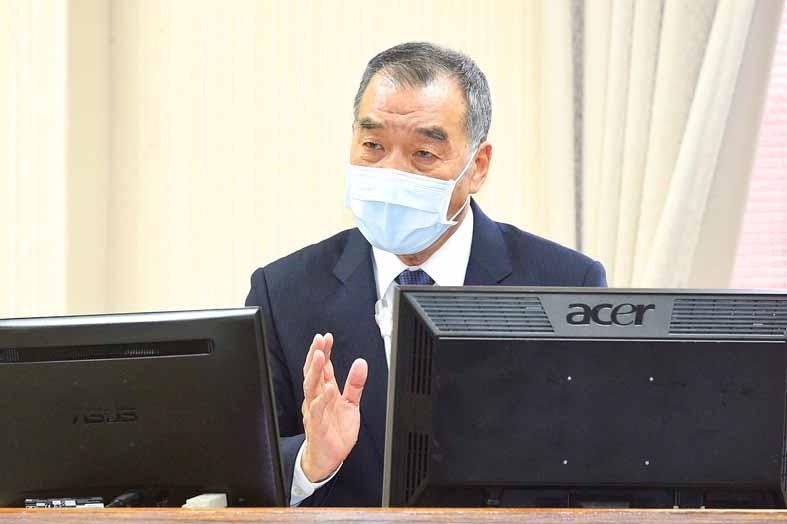Minister of National Defense Chiu Kuo-cheng (邱國正) yesterday said he has full confidence in the military’s counterespionage capabilities in response to a foreign media report that Chinese spies had infiltrated the nation’s military to steal defense technologies and plans.
“The nation’s armed forces have comprehensive protective measures in place to guard against Chinese espionage,” Chiu told reporters on the sidelines of a legislative session.
The military’s counterintelligence efforts include training to encourage military personnel to report initial contact with suspected spies and reward those who do so, Chiu said.

Photo: George Tsorng, Taipei Times
The Ministry of National Defense investigates reports of suspected espionage, he said, adding that the measures have proven successful over the years.
Chiu’s comments came after a Reuters special feature, published on Monday, described several espionage cases and “how Beijing allegedly sought out commanders in Taiwan’s military and induced them to become spies.”
Chinese officials were also able to “extract details of high-tech weapons and gain insights into defense planning” through personnel from Taiwan’s military over the past 10 years, the report said.
Citing a Reuters review of court records and reports from Taiwan’s official news agencies, the report said that in the past decade, at least 21 serving or retired Taiwanese officers with the rank of captain or above have been convicted of spying for China.
At least nine other serving or retired members of the armed forces are currently on trial or being investigated on suspicion of having had contact with spies from China, the report said.
The ministry on Tuesday said that no confidential military intelligence had been leaked in these cases, as all of the interactions had been detected in the early stages.
Chiu attended yesterday’s legislative session to brief lawmakers on the military’s response measures amid increasing military coercion from Beijing.
In his report, Chiu said Chinese People’s Liberation Army aircraft have made more than 940 incursions into Taiwan’s air defense identification zone since January.
In response, Taiwan’s military has continued to bolster its defense capabilities and enhance its weapons’ range, precision and mobility, based on the nation’s asymmetrical warfare plan, the report said.

A preclearance service to facilitate entry for people traveling to select airports in Japan would be available from Thursday next week to Feb. 25 at Taiwan Taoyuan International Airport, Taoyuan International Airport Corp (TIAC) said on Tuesday. The service was first made available to Taiwanese travelers throughout the winter vacation of 2024 and during the Lunar New Year holiday. In addition to flights to the Japanese cities of Hakodate, Asahikawa, Akita, Sendai, Niigata, Okayama, Takamatsu, Kumamoto and Kagoshima, the service would be available to travelers to Kobe and Oita. The service can be accessed by passengers of 15 flight routes operated by

Chinese spouse and influencer Guan Guan’s (關關) residency permit has been revoked for repeatedly posting pro-China videos that threaten national security, the National Immigration Agency confirmed today. Guan Guan has said many controversial statements in her videos posted to Douyin (抖音), including “the red flag will soon be painted all over Taiwan” and “Taiwan is an inseparable part of China,” and expressing hope for expedited reunification. The agency last year received multiple reports alleging that Guan Guan had advocated for armed reunification. After verifying the reports, the agency last month issued a notice requiring her to appear and explain her actions. Guan

GIVE AND TAKE: Blood demand continues to rise each year, while fewer young donors are available due to the nation’s falling birthrate, a doctor said Blood donors can redeem points earned from donations to obtain limited edition Formosan black bear travel mugs, the Kaohsiung Blood Center said yesterday, as it announced a goal of stocking 20,000 units of blood prior to the Lunar New Year. The last month of the lunar year is National Blood Donation Month, when local centers seek to stockpile blood for use during the Lunar New Year holiday. The blood demand in southern Taiwan — including Tainan and Kaohsiung, as well as Chiayi, Pingtung, Penghu and Taitung counties — is about 2,000 units per day, the center said. The donation campaign aims to boost

The Central Weather Administration (CWA) said a magnitude 4.9 earthquake that struck off the coast of eastern Taiwan yesterday was an independent event and part of a stress-adjustment process. The earthquake occurred at 4:47pm, with its epicenter at sea about 45.4km south of Yilan County Hall at a depth of 5.9km, the CWA said. The quake's intensity, which gauges the actual effects of a temblor, was highest in several townships in Yilan and neighboring Hualien County, where it measured 4 on Taiwan's seven-tier intensity scale, the CWA said. Lin Po-yu (林柏佑), a division chief at the CWA's Seismological Center, told a news conference